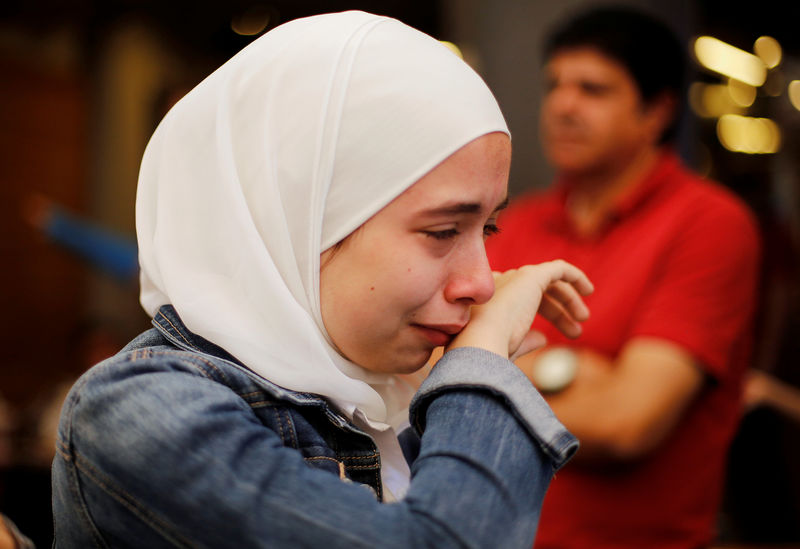BEIRUT (Reuters) - Many Syrians grieved the end of their national side's unlikely march towards the World Cup finals on Tuesday, but others were relieved as it meant President Bashar al-Assad could not capitalise on the success.
Syria lost 2-1 to Australia in the second leg of their Asian qualifying playoff in Sydney on Tuesday, after last week's first leg finished 1-1, dashing the country's hopes of reaching the tournament for the first time.
Thousands gathered to watch the match in squares and stadiums across government-controlled areas of Syria, where schools were closed early to allow fans to tune in.
Syrians driven from their country by war also gathered to watch from abroad, though some of them were cheering for Australia, who will face either the United States, Panama or Honduras in November to seal qualification to the finals in Russia next year.
The support for the opposition underlined the deep divisions in a society split by six years of conflict.
"I'd rather the Syrian team lose so that the regime will not get more legitimacy," said Syrian Salah al-Ashkar, a 29-year-old from Aleppo, speaking from Paris.
An opposition activist, posting on Facebook (NASDAQ:FB), thanked the goal post for denying Syria a late equaliser.
Large crowds gathered to watch the match on a big screen at the central Damascus Umayyad square. State TV broadcast footage of fans watching in large numbers in the cities of Aleppo, Homs, and Latakia.
"The importance of this match was that it brought people together... all parts (of society) were happy," said Alia Abdallah in Damascus.
Syria's conflict has killed hundreds of thousands, pushed more than half its people from their homes and sent millions abroad as refugees. This made it hard for many Syrians to get behind the national side.
Ayman Hilal, originally from Homs, said he would not be cheering for his country but still came out to watch the match at a coffee shop in the Lebanese city of Tripoli.
"The Syrian team does not represent me, nor does it represent a great chunk of the people," he said, with the anti-Assad opposition flag draped over his shoulders.
TWO FLAGS
The Australian authorities allowed only the official national flags of Australia and Syria into Tuesday's match. Hilal's opposition flag was among a list of flags banned from Sydney's ANZ stadium.
A stadium spokesman told Reuters "a small number of banners" were prevented from entering the stadium. Pictures on pro-opposition social media accounts showed a "Free Syria" sign and an opposition flag raised within the crowd.
Mohammed Rasheed, a spokesman for the Syrian rebel group Jaish al-Nasr group, gloated over Syria's 2-1 defeat, using what became a popular Twitter hashtag.
"Congratulations #team_barrel," he wrote on Twitter, referring to barrel bombs - drums or cylinders packed with explosives and shrapnel that cause indiscriminate damage when dropped from the air.
The United Nations has condemned Assad's government for dropping barrel bombs, though Damascus has denied using them.

Some Syrians supported the team, despite their opposition to Assad. "I was delighted that Syrian hearts are beating with anxiety for the same reason. I wish we could stop looking for things that draw us, as Syrians apart," said 44-year-old Syrian Majed al-Atassi who lives in Dubai.